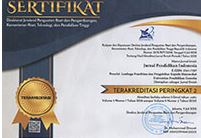Students’ Readiness toward English Learning Post Covid-19 Pandemic in SMPN 6 Singaraja
Keywords:
Students' Readiness, Post-pandemic, Cognitive ReadinessAbstract
Student readiness is one aspect that needs to be considered before the learning process begins. Many researchers analyzed student readiness in learning, but unfortunately, only a few researches that checked how students’ learning readiness is in the post-pandemic covid-19. This research was conducted to find out the students' readiness toward English learning in post-pandemic covid-19. The researcher used a quantitative research and used questionnaire to collected the data. The participants of this study were 145 students The quantitative data were analyzed using descriptive analysis about the central tendency of the data. The study showed that the students had the readiness to face new learning situations in post-pandemic Covid-19 in learning English, but were not fully prepared. Based on the results, it is known that students are still not fully prepared in their cognitive readiness section due to a lack of students' understanding of common languages in learning English. Further research is recommended to research related to how to improve students' abilities, especially in the vocabulary mastery section in the post-pandemic covid-19.
References
Abdillah, J. A., & Sueb. (2022). Students’ Learning Motivation toward the Implementation of Blended Learning During Post-Pandemic Efl Classroom. Pioneer: Journal of Language and Literature, 14(1), 278-297
Abdous, M. H. (2019). Influence of satisfaction and preparedness on online students’ feelings of anxiety. The Internet and Higher Education, 41, 34-44. DOI: https://doi.org/10.1016/j.iheduc.2019.01.001
Agustiani, I. W. D., Gumartifa, A., & Yaman, H. (2021). Readiness To Learn: Principles. Contributing Factors And How It Affects Learning. English Community Journal, 5 (2), 102-119
Al-Hasmi, S. (2021). A Study on the Impact of the Sudden Change to Online Education on the Motivation of Higher Education Students. Canadian Center of Science and Education, 11(3), 78-88. doi:10.5539/hes.v11n3p78
Asrar, Z., & Rashid, N. T. H. (2018). The Impact of Communication Between Teachers and Students: A Case Study of the Faculty of Management Sciences, University of Karachi, Pakistan. European Scientific Journal, 14(16), 32-39. Doi:10.19044/esj.2018.v14n16p32
Bordeos, M.L., Lagman, K. R., & Crus, I. (2022). Students in the New Normal: Their Experiences in the Pandemic's Limited Face-to-Face Classes. American Journal of Education and Technology (AJET), 1(3), 42-51 DOI:10.54536/ajet.v1i3.979
Chorrojprasert, L. (2020). Learner Readiness Why and How Should They Be Ready. Language Education and Acquisition Research Network Journal (13)(1) 268-274
Evans, C., O’Connor, C. J., Graves, T., Kemp, F., Kennedy, A., Allen, P., Bonnar, G.,Reza, A., & Aya, U. (2020). Teaching under lockdown: The experiences of London English teachers. Changing English: Studies in Culture and Education, 27(3), 244–254. https://doi.org/10.1080/1358684X.2020.1779030
Efriana, L. (2021). Problems of Online Learning during Covid-19 Pandemic in EFL Classroom and the Solution. JELITA: Journal of English Language Teaching and Literature, 2(1), 38-47.
Fletcher J.D. (2004). Cognitive Readiness: Preparing for the Unexpected. Institute for Defense Analyses
Gray, K. (2016) Academic Readiness: Definition & Assessment. Retrieved from https://study.com/academy/lesson/academic-readiness-definition-assessment.html.
Kusuma, I. P. I. (2022). EFL teachers’ online teaching in rural schools during the COVID-19 pandemic: Stories from Indonesia. Studies in English Language and Education, 9(1), 203-221
Li, D. (2022). The Shift to Online Classes During the Covid-19 Pandemic: Benefits, Challenges, and Required Improvements from the Students’ Perspective. The Electronic Journal of e-Learning, 20(1)
Mabaroh, B., & Sugianti, L. (2021). Gadget Addiction and the Students’ Achievement. International Journal of Social Learning, 1(3), 321-332. DOI: https://doi.org/10.47134/ijsl.v1i3.59
Maddox, N., Forte, M., & Boozer., R. (2000). Learning Readiness: An Underappreciated Yet Vital Dimension In Experiental Learning. Developments in Business Simulation & Experiential Learning, Volume 27
Madya, S. A., & Abdurahman (2021). Online Learning Implementation in the Covid-19 Pandemic. Advances in Social Science, Education and Humanities Research, 539, 26-31 DOI:10.2991/assehr.k.210325.005
Martin, F., Stamper, B., & Flowers, C. (2020). Examining student perception of their readiness for online learning: Importance and confidence. Online Learning, 24(2), 38-58. https://doi.org/10.24059/olj.v24i2.2053
Sakkir, G., Dollah, S., & Ahmad, J. (2021). E-Learning in COVID-19 Situation: Students’ Perception. EduLine: Journal of Education and Learning Innovation, 1(1), 9-15. https://doi.org/10.35877/454RI.eduline378
Sewang, A., & Aswad, M. (2021). The Readiness of Learning Processes during the New Normal Era of the Covid-19 Pandemic. Indonesian Research Journal in Education (IRJE), 5(1), 279-292
Sledd, J. (1986). A Basic Incompetence in the Defining of Basic Competencies. The English Journal, 75(7), 26–28. https://doi.org/10.2307/818489
Sugiyono. 2017. Metode Penelitian Pendidikan (Pendekatan Kuantitatif, Kualitatif, dan R&D). Bandung:Alfabeta.
Tarkar, P. (2020). Impact Of Covid-19 Pandemic On Education System. International Journal of Advanced Science and Technology, 29(9), 3812-3814
Yuksel, I. & Yuksel, I. (2012). The importance of students’ readiness levels in program evaluation studies. DOI:10.1016/j.sbspro.2011.12.167










